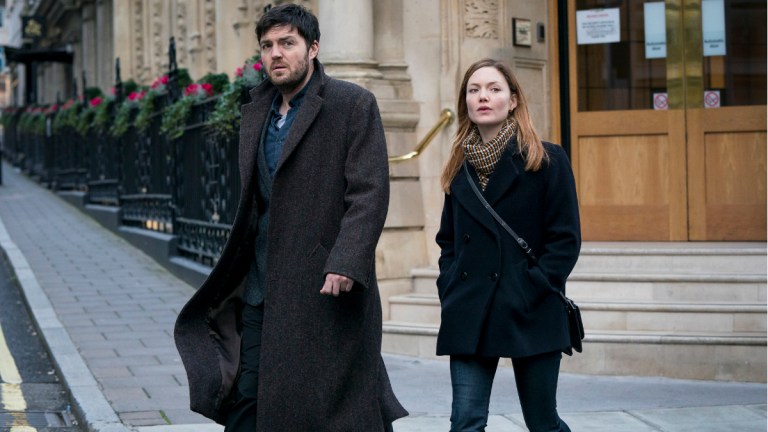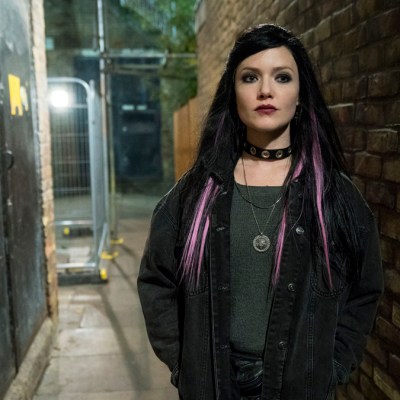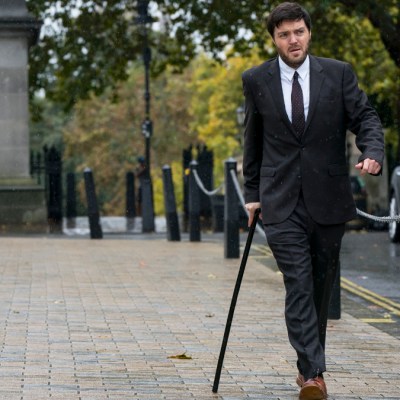Strike: Lethal White Episode 4 Review: a Tangled Ending Saved by Cast Chemistry
Frankly, who cares who the killer was? Strike fans are here for Robin and Cormoran’s longing looks. Spoilers in our Lethal White finale review.

This Strike: Lethal White review contains spoilers.
Put your hand up if the conclusion to Lethal White’s investigation left you nonplussed and the killer revelation felt by-the-by. Now put your other hand up if that’s basically fine because you couldn’t give a McVitie’s fig roll who murdered Jasper Chiswell, or why, or by what means.
Finally, take both hands down, make loose fists and draw a scruffy Cornish beard on one and the face of an English rose on the other, then smoosh them together while making kissy noises. Until the Troubled Blood adaptation arrives, that’s as good as we’re going to get.
There were plenty of high points in the Lethal White finale. There was the pained expression on Robin’s face as she watched Strike and Charlotte walk away while assuring her mum on the other end of the phone that yes, she’s left Matthew and that no, she’s not with anyone else. There was the longing look Strike gave Robin as they sat drinking whisky in the office after hours. There was Strike touching his mouth to catch the feel of Robin on his lips after that awkward hug-kiss. There was an arm around shoulders, a confession, a heart-felt compliment and a smile. There was a question about the future and the promise of curry and beer.
All of the above, thanks to the magnetic power of Tom Burke and Holliday Grainger, were a delight to watch. The tangled case however, with its two horse paintings, Zimbabwean gallows, beastly aristos, inheritance scheming and narrowboat stand-off? Whatever. It happened.
Given my druthers, the finale would have lost Henry Drummond, Jimmy Knight, Tegan the horse lady, the butcher, the baker and the candlestick maker, and in its place given us a silent 20-minute cut of the scene where a pissed Strike gazes across the desk at Robin like she’s water in the desert. Admittedly, such a change to the format would have forced Strike to move to BBC Four before being immediately cancelled, so really, it’s for the best I’m not allowed to decide this stuff.
The people who do decide this stuff – screenwriter Tom Edge and director Sue Tully – did a good job condensing a long and complicated book plot into just four episodes. Whatever plot threads are left dangling from the case (what happened to Jimmy Knight and Flick? Is anybody investigating the disappearance of Suki from the children’s home? Where was Raff’s probation officer in all this?), Lethal White never lost sight of the characters’ emotions. In particular, one character’s emotions: this was Robin’s series through and through. She even got its last word, striding off purposefully into the London skyline to a song by The Verve. (Hear those lyrics, Robin? Yes, there’s love if you want it).
Until the finale, Cormoran had been a closed book – a pity because, as that restaurant scene with Charlotte showed, Tom Burke is thrilling when Strike’s exercised about something. A tremendous amount of ‘YES, SON!’ energy is manufactured every time an expletive falls from his mouth. “Look me in the eye and tell me that you haven’t loved anyone since, the way you loved me,” begged Charlotte. “I haven’t,” said Strike, “Thank fuck for that. I’m off.” YES. SON. The moment he popped up on the boat to spark Raff out and call him a cowardly little fuck should be commemorated on a limited edition tea towel.
Needs must mention the case (if you’re still scratching your head, the plot is untangled here). In summary: Billy’s strangled-to-death-little-girl turned out to be neither strangled-to-death nor a little girl. She was in fact little illegitimate Raff, being brutalised by his horrid bully of a step-brother, Freddie. As revenge for a lifetime of their father worshipping the ground Freddie walked on and cutting Raff out of his will, as well as a scheme to get his hands on what nobody else in the family had realised was a rare Stubbs painting worth £20 million, Raff killed Jasper. He didn’t act alone, but manipulated Kinvara into aiding and abetting as part of his long game to get the painting. Raff was also behind Geraint Winn and Jimmy Knight’s blackmail of his father, tipping them off about the illegal gallows export that stiffed the Knight boys of their £40 grand share. Top anti-capitalism, there, Jimmy.
On first watch, it all seemed to make about as much sense as it did to a drugged-up Billy. Very useful of Robin on the boat, wasn’t it, to provide that blow-by-blow summary so that anyone dozing at the back could keep up. (Speaking of the dozy, I was dead wrong about that cab driver prediction in episode three, but side note to casting directors: hire Annette Badland for proper roles!)
Billy’s vindication was satisfying and easy to invest in thanks to Joseph Quinn’s vulnerable performance. Poor Izzy’s lament on the fallen Chiswell men, however, was hard to feel anything much about – good riddance, love, you’re better off without them. The most touching case scene belonged to Robert Pugh as Geraint Winn, whose grief and torment over his daughter’s suicide was movingly conveyed.
When it comes to satisfaction, nothing in the case could top Robin finally confiding in Strike after a year plus of the pair moving in awkward circles around each other. Thanks to Jimmy Knight’s vile threats, she could no longer hide her panic attacks, and the roadside heart-to-heart released the pressure valve that’s been tightening with every episode this year.
Robin clearly felt the benefit and closed the series on a high. She’s dealing with her anxiety, free of “Matt the accountant who’s a bit of a prick” (his full title henceforth), and setting up the next case for the Strike Ellacott Detective Agency. As long as Burke and Grainger are at its centre, whatever comes next, we’ll be watching.


